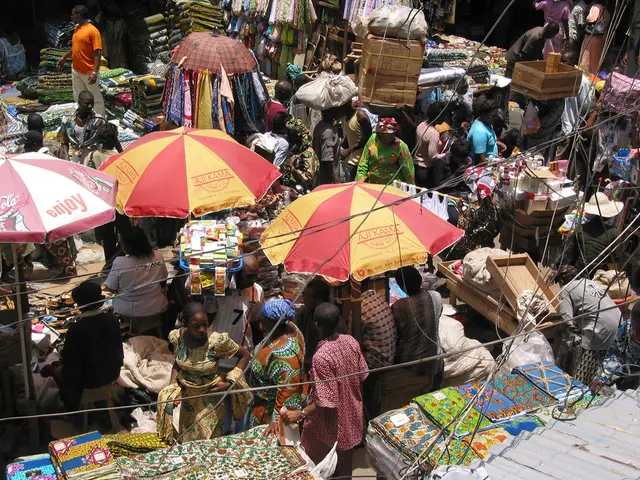International Monetary Fund Urges Caution on Energy-Intensive Bitcoin Mining Proposal by Pakistan
Pakistan is moving forward with its first strategic Bitcoin reserve, which includes plans for a national Bitcoin wallet and an allocation of energy resources for the digital asset ecosystem. However, the International Monetary Fund (IMF) has expressed concerns about this initiative, highlighting potential challenges related to energy consumption, regulatory clarity, and the broader impact on the power sector.
The IMF's inquiry comes amid concerns over Pakistan's ongoing energy shortages and broader fiscal challenges. The allocation of 2,000 megawatts (MW) of electricity for Bitcoin mining and AI data centers raises concerns over energy stability and environmental impact, especially considering the country's seasonal energy demand variations and monsoon-related disruptions.
To address these concerns, Pakistan has launched the Pakistan Crypto Council (PCC) and is in the process of establishing the Pakistan Digital Assets Authority (PDAA), a regulatory body aimed at overseeing blockchain financial infrastructure and formalizing digital finance frameworks. The regulatory approach includes licensing crypto exchanges, developing a Bitcoin reserve, and exploring stablecoin launches, all while balancing innovation with investor protection.
The government collaborates internationally, such as with El Salvador, another IMF program country, on energy-efficient mining and blockchain education initiatives to support sustainable development of the crypto ecosystem.
However, the IMF's caution reflects the novelty and risk of rapid scale-up in electricity-intensive digital asset mining amid a still-developing energy infrastructure. The IMF typically emphasizes energy sustainability, fiscal discipline, and regulatory oversight in countries receiving its programs, so concerns likely center on ensuring that the energy divestment to crypto sectors does not undermine power sector stability or fiscal health.
The IMF delegation is currently conducting virtual discussions with Pakistani authorities, and the outcomes of these discussions could set important precedents for how developing nations approach cryptocurrency regulation and infrastructure development. The economic team is facing stiff questions, and this move has added to the complexities of the ongoing talks between Pakistan and the IMF.
Readers are encouraged to conduct their own research and consult with a qualified financial adviser before making any investment decisions. Meanwhile, Russia has imposed a 6-year crypto mining ban in the energy-hit Irkutsk Oblast, highlighting the diverse approaches countries are taking towards digital asset mining.
References:
[1] Pakistan Today. (2025, March 1). Pakistan to launch first strategic Bitcoin reserve. Retrieved from https://www.pakistantoday.com.pk/2025/03/01/pakistan-to-launch-first-strategic-bitcoin-reserve/
[2] The Express Tribune. (2025, March 2). Pakistan to create national Bitcoin wallet, allocate 2,000 MW for digital assets. Retrieved from https://tribune.com.pk/story/2245677/pakistan-to-create-national-bitcoin-wallet-allocate-2000-mw-for-digital-assets
[3] The News International. (2025, March 3). IMF questions Pakistan's Bitcoin reserve initiative, electricity allocations. Retrieved from https://www.thenews.com.pk/latest/808597-imf-questions-pakistans-bitcoin-reserve-initiative-electricity-allocations
[4] The Financial Express. (2025, March 4). Pakistan's Bitcoin reserve initiative: Balancing innovation with investor protection. Retrieved from https://finance.thefinancialexpress.com.pk/pakistans-bitcoin-reserve-initiative-balancing-innovation-with-investor-protection/
[5] The Nation. (2025, March 5). Pakistan to regulate crypto sector, develop digital assets authority. Retrieved from https://nation.com.pk/25-mar-2025/pakistan-to-regulate-crypto-sector-develop-digital-assets-authority
- Amidst the ongoing Bitcoin reserve initiative in Pakistan, the Pakistan Digital Assets Authority (PDAA) is being established as a regulatory body to oversee blockchain financial infrastructure and formalize digital finance frameworks, including licensing crypto exchanges and developing a Bitcoin reserve.
- The International Monetary Fund (IMF) has raised concerns about Pakistan's 2,000 MW electricity allocation for Bitcoin mining and AI data centers, questioning the potential impact on energy stability and environmental implications, particularly during seasonal energy demand variations and monsoon-related disruptions.
- As the IMF delegation engages in virtual discussions with Pakistani authorities, the outcomes of these discussions may set important precedents for cryptocurrency regulation and infrastructure development in developing nations, reflecting the significance of the ongoing talks between Pakistan and the IMF on these matters.




